新概念英语第二册第四课课件Lesson 4 An exciting trip
新概念第二册LessonAnexcitingtrip专题培训课件

(2) vt. 招待,接待
You need a large room if you are going to receive so many guests. 如果你要接待这么多客人,你就需要一个大房间。 We usually receive guests on Saturday.我们通常周六接待宾客。
我收到一封信,上面说他们已经 同意接收那个小孩子了。
2 Text Explanation
I have just received a letter from my brother, Tim. He is in Australia. He has been there for six months. Tim is an engineer. He is working for a big firm and he has already visited a great number of different places in Australia. He has just bought an Australian car and has gone to Alice springs, a small town in the centre of Australia. He will soon visit Darwin. From there, he will fly to Perth. My brother has never been abroad before, so he is finding this trip very exciting.
When did you receive that letter?你什么时候收到那封信的? Susan received a gift/card this morning.
新概念第二册lesson-4PPT课件
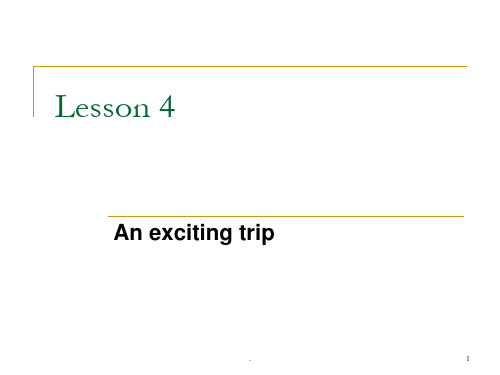
be over
catch a cold
have a cold get up be up
get to know
know
get out
be out
close
be closed wake up
be awake
go to sleep
be asleep/ sleep
become interested in
be interested in
.
29
it’s the first time(第一次); so for(到目前为止); so far this morning(到上午为止); up to now(直到现在); up to the present(直到目前);just(刚
刚);
recently(最近); already(已经); lately(最近);now(现在);for 一段时间;
.
17
A great number of
表示很多的,只能修饰可数名词复数。great, large,good,small,certain 表达不同的数 量
类似表达 few /a few /several/ many/ a great/good many/ a number of /a large number of/ numbers of
.
22
1) 影响现状动作: 即表示,该动作已经完成, 但是对现在有影响。
何谓有影响? 现在完成时与过去式比较
I had dinner. 我曾经吃了晚饭。(我吃过了晚饭,但与现在无
关,现在可能饿了)
I have had dinner. 我已经吃过晚饭。(我已经吃过了晚饭,现在已
经饱了) He has broken his leg. 他的腿断了。 (还没好) He broke his leg. 他腿曾经断过。 (已经好了)
新概念英语第二册第4课课件(共22张PPT)

课文链接(1)
课文链接(2)
课文链接(3)
课文链接(4)
课文链接(5)
Grammar(语法1):现在完成时
Grammar(语法2) 现在完成时
Summary writing.(摘要写作1)
1)What has the writer just received from his brother , Tim? The writer has just received a letter from his brother, Tim. 2)Is Tim an engineer, or is he a doctor? Tim is an engineer. 3)How long has he been in Australia? He has been in Australia for six months. 4)Has he already visited many places or not? Yes, he has already visited a great number of places. 5)Where is he now? He is in the small town Alice Springs in the centre of Australia. 6)Has Tim ever been abroad before or not ? No, he hasn’t been abroad before. 7)Is he enjoying his trip very much or not? Yes, he is enjoying his trip very much.
Read the text !
I have just received a letter from my brother,Tim. He is in Australia. He has been there for six months. Tim is an engineer. He is working for a big firm and he has already visited a great number of different places in Australia. He has just bought an Australian car and has gone to Alice Springs, a small town in the centre of Australia. He will soon visit Darwin. From there , he will fly to Perth. My brother has never been abroad before, so he is finding this trip very exciting.
新概念二Lesson 4 An exciting trip课件

2. 否定式
• 现在完成时的否定式就是在has/have后加 not,have not可缩写为haven’t,has not可 缩写为hasn’t。 • I haven’t found my lost cat. • 我还没有找到我丢失的猫。 • She hasn’t finished her homework yet. 她还 没有完成她的家庭作业。
My plan/idea is different from yours. (2)各种各样的,不同的: Eg:He has visited many different places in China. 他去过中国的不少地方。
adv. differently, n. difference
centre n.中心,中央 (美式center)
Lesson 4 An exciting trip 激动人心的旅行
Байду номын сангаас
Vocabulary
exciting adj.令人兴奋的, 振奋人心的
Eg:这是多么令人兴奋的消息! What exciting news this is!
exciting a.令人兴奋的, 使人激动的(主语是 物) Eg:This news is very exciting . excited a.(自己)感到兴奋的(主语是人) Eg:We are very excited about this news.
辨析: receive, accept, take这三个词都有“ 接受”的意思。
• receive(客观情况)只表示被动地接受 • accept(主观情况)总表示主动而且高兴地接 受 • take 则是主动的“拿”、“取”也可以作收到 take the exam take advice Eg:She received his present, but she didn’t accept it.
新概念英语(lesson-4-An-exciting-trip)(共28张PPT)
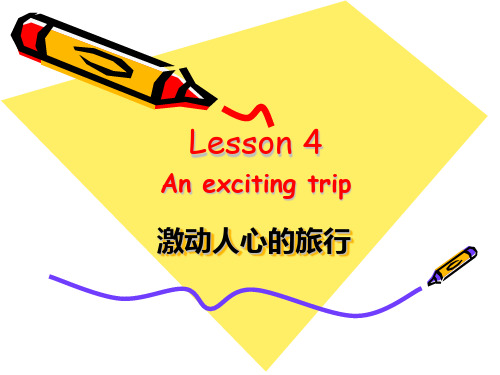
• … and he has already visited a great number of different places in Australia.
a number of + 可数名词复数
a large number of a great number of a small number of
first date with her “Mr. Right”.
(3) adj. -ing 令人......
-ed 感到......
interesting
interested 有趣的
relaxing
relaxed
放松的
moving
moved
感动的
touching
touched
感动的
surprising
firm n. 商行,公司
abroad adv. 在国外
1.exciting adj. 令人兴奋的
(1) excite v. 另......兴奋
excite sb. 让某人兴奋
(2) excited adj. 感到兴奋的 be excited at sth. 对...感到兴奋
e.g. The excited girl is looking forward to her exciting
• I have just received a letter from my brother, Tim.
Tim用来解释brother的名字
同位语 ——对前面一个名词进行进一步的
解释和说明
My boss, Mr. Williams, will meet me in the afternoon.
I’d like you to meet my friend, James.
新概念英语第二册Lesson4课件
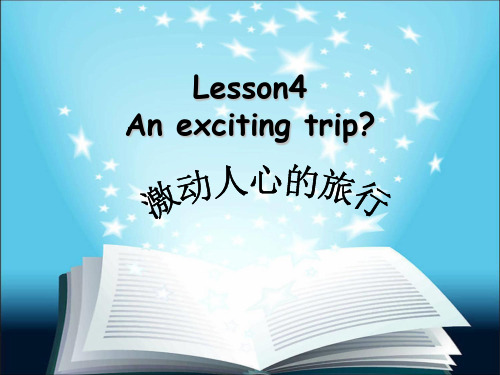
New words
firm n.商行,公司 law firm法律公司
公司
=company
different adj.不同的—— same相同的
adv. differently, n. difference
e.g. My coat is different from yours.
和…相同,一样
be the same with/as
--他们已经离开了,也就是说现在他们人不在这里
I have had my lunch.
--我已经吃过午饭了,也就是说我现在不饿
也可表示持续到现在的动作或状态。
He has learned English since 2001.
现在完成时与一般过去时的比较
1)一般过去时表示过去某时发生的动作或 单纯叙述过去的事情,强调动作;
yesterday.
6. There ___w_a__s(be) a telephone call for you just now. 7. When _d_i_d___ you _c_o__m__e(come) to China?
----Last year.
8. Yesterday I _t_h_o_u__g_h__t (think) that you were not in
现在完成时为过去发生的,强调过去的 事情对现在的影响,强调的是影响。
I saw this film yesterday. (强调看的动作发生过了。) I have seen this film. (强调对现在的影响,电影的内容已经知道 了。)
Grammar
2一般过去时常与具体的表示过去的时间状语连用; 现在完成时通常与模糊时间状语连用或无时间状语。
新概念2 Lesson 4课件(共39张PPT)

3.He has been there for six months. 他在澳洲已经待了六个月了。 for six months是表示时间段的状语。 特别提醒:"for+时间状语"不能和瞬间性动词连用。 He arrived there for six months.(错误) He has been there for six months.(正确)
gone to Alice Springs, a small town in the centre of
Australia. 他刚买了一辆澳洲产的小汽车,现在去了在澳大利亚中部 的一个小城镇,艾莉斯普林斯。 (1) 比较两个句子:He has gone to the cinema.
他去了电影院。(还没有回来)
finding this trip very exciting. 我弟弟以前从来没有出过国,所以他觉得他的这次旅行非 常激动人心。 (1) before单独放在句尾表示从前,常与完成时连用。 (2 )very exciting补充说明this trip,做宾语补足语。
语法 Grammar in use
7.He will soon visit Darwin. 很快,他将去参观达尔文。
1)visit somewhere参观某地: visit Shanghai参观上海; visit Zhouzhuang参观周庄
2)visit sb.拜访某人: visit my uncle看望我的伯父; visit closet classmate拜访最亲密的同学
a great /good lot fun大量的玩笑 4)a whole lot of一大堆,许多:
a whole lot of paper一大堆纸 5)a great number of很多的,常修饰可数名词 6)a great many很多的(多用于写作中),常修饰可数 名词
新概念英语第二册第四课 lesson 4 An exciting trip课件
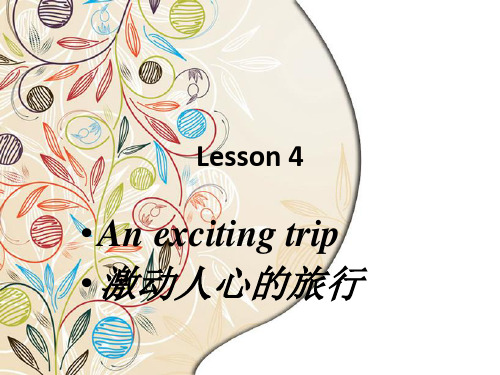
the Capital city : Canberra堪培拉
the famous city : Sydney 悉尼
Kangaroo袋鼠
sheep (one sixth); wool (one third )
Kola Bear :考拉熊
Important words
• exciting • receive • firm • different • centre • abroad
2021/4/7
区别用法:receive, accept, take
• 区别用法:receive, accept, take这三个词都 有“接受”的意思。
• receive(客观情况)只表示被动地接受
• Then he smiled and told me I would receive an extra £100 a year! 后来他笑了,并且告 诉我说,我将一年收到一百英镑的额外收 入!
2021/4/7
Ⅲ Text study
1. Firm公司=company, law firm factory工厂
2. a great number of =a great/g of 修饰不可数名词 a great/good deal of 可数/不可数名词
• Soon got, Soon gone. 来得容易去得快。
5. have been to +sp.去过
have gone to +sp.去了还未回来
• I have never been to Australia. • He has gone to Australia.
2021/4/7
7. 坐飞机 • fly to Australia • go to Australia by
新概念第二册第4课PPT

firm n. 商行,公司,事务所 通常情况下规模比较小。
law firm 法律事务所 accounting firm 会计师事务所 company :泛指所有的企业,公司 company limited 有限责任公司 (Ltd.) corporation:股份公司,一般规模较大 Corporation limited (Ltd.)
now.
A. has had
B. has bought
C. will wait
D. has borrowed
2. When Jack arrived, he learned Mary _____for almost an hour.
A. had gone
B. had left
完成句子
1、They have been here since 2000. (对划 线部分提问)
Key structure
现在完成时 have/has + 过去分词 (done) 1. 动作发生在过去,强调对现在产生的影响 He has already turned off the light. I have just had dinner/ watched the movie. 用于该用法的时间状语 : already,yet,just等 already 变为否定句要改为yet,放于句末 He hasn’t turned off the light yet.
have they been here? 2、The old man _________ last year. He _________for a year. (die) (动词填空)
注意:for+时间段 for half an hour/ 2 months…
新概念英语第册二Lesson4——an exciting trip课件

Pronunciation
• exciting • receive • firm • different • centre • abroad
[ɪk'saɪtɪŋ] [rɪ'siːv] [fɜːm] ['dɪfərənt] ['sentə] [ə'brɔːd]
adj. v. n. adj. n. adv.
正在一家大公司工作。
He is working for a big firm.
并且已经去过澳大利亚的不少地方了。 and he has already visited a great number of different places in Australia. 他刚买了一辆澳大利亚小汽车。
He has just bought an Australian car
work on (Book I-L87) 从事于....../继续工作......
用receive, hear或take填空
1. I have just _r_e_c_e_i_v_e_d_ a letter from my brother. 2. Please ___t_a_k_e___ this book to your sister. 3. I have just ___h_e_a_r_d__ from my brother. 4. We ____t_o_o_k___ our books with us yesterday.
in the middle 是指在小范围的中间 e.g. There is a teacher in the middle of the classroom.
7. abroad
adv.在国外
go abroad 出国
新概念二-第4课课件

课文注释
1.I have just received a letter from my brother,Tim receive a letter from sb. = hear horm so. 收到某人的采信 wrile to sb.给某人写信 Tim同位语(Appositives) 一个名词(或短语等)与另一个名词(或短语)并列而作为其说明或限定成分时称为同位语。同 位语与它所补充说明的成分之间用逗号隔开。课文中有两句话含有同位语: I have just received a letter from my brother, Tim. 我刚刚收到弟弟蒂姆的来信。(Tim是my brother的同位语。它们指的是同一个人。Tim用来补充 说明my brother的名字)
★3.road adv.在国外 注意是个副词,直接和动词连用, 不需要介词go/live/study abroad
★4.firm n.商行,公司 adj.坚定的;牢固的
等同于company
different adj.不同的--same相同的
adv. differently n.difference 差异
text
Listen and fill in the blanks:
I have just ___________ a letter from my brother. Tim. He is in Australia. He ___________ there for six months. Tim is an engineer.He ___________ for a big firm and he ___________________a great number of different places in Australia. He has just bought an Australian car and ___________ to Alice Springs, a small town ___________________ Australia. He will soon visit Darwin.From there,he will fly to Perth.My brother ___________ been ___________ before, so he is finding this trip very ___________.
Amy-新概念英语第二册 Lesson 4课件
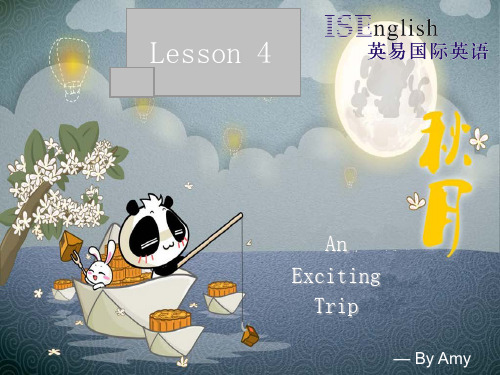
hear from sb.
He has been there for six months.
♥ Has been to some place /has been there 去过某地 (已回) ♥ Has gone to some place /has gone there 去了某地 (未回) 你有去过香港吗? 我从来没去过那里。 他去了香港。
I’ve worked here for three years/since three years ago.
have worked
我在这里已经干了三年了。
(过去) (现在) (将来)
since three years ago (时间点)
for three years (持续时间)
我们打小时候起就彼此很熟悉。
这个消息令我感到兴奋。 The news excited me.
接到,收到,得到
receive When did you receive that letter?
vt. 招待,接待 如果你准备接待很多宾客你需 要一个大的房间。 You need a large room if you are going to receive so many guests. ♥receive是“收到”,指的是一个 被动的动作,主观上接受与否不清 楚。
receive/have a letter from sb.
你什么时候收到那封信的?
receive ,accept, take 的区别
♥accept总表示主动而且高兴地 接受( 接受,领受,认可,同意) He accepted a present from his friend.
他接受了朋友的礼物。
Has he/she/it worked?
- 1、下载文档前请自行甄别文档内容的完整性,平台不提供额外的编辑、内容补充、找答案等附加服务。
- 2、"仅部分预览"的文档,不可在线预览部分如存在完整性等问题,可反馈申请退款(可完整预览的文档不适用该条件!)。
- 3、如文档侵犯您的权益,请联系客服反馈,我们会尽快为您处理(人工客服工作时间:9:00-18:30)。
Lesson 4 An exciting trip
Today we’ll learn a story about a trip to Australia.How much do you know about Australia?
一、Read the text,and answer these questions:
1. How long has Tim been in Australia?_______________________
2.What dose he do in Australia?_____________________________
3. Why is Tim finding the trip exciting?_______________________
I have just received a letter from my brother, Tim. He is in Australia. He has been there for six months. Tim is an engineer. He is working for a big firm and he has already visited a great number of different places in Australia. He has just bought an Australian car and has gone to Alice Springs, a small town in the centre of Australia. He will soon visit Darwin. From there, he will fly to Perth. My brother has never been abroad before,
so he is finding this trip very exciting.
澳大利亚国旗的左上角为英
国国旗,因为澳大利亚曾是
英国的附属国,独立后表明
与英国的传统关系。
英国女
王到了澳大利亚,应该给予
最高形式的欢迎!
Koala,考拉,又称为树袋熊,
名字来源于土著文字,意为
“no drinking”(不喝水),因
为树袋熊从他们取食的桉树
叶中获得所需的90%的水
分,只在生病和干旱的时候
喝水。
考拉每天18个小时都
在睡觉,性情温顺,体态憨
厚,萌哒哒。
Kangaroo,袋鼠,澳大利亚
之所以让袋鼠作为国徽上动
物之一,一个重要原因,就
是它永远只会往前跳,永远
不会后退。
希望人们也有像
袋鼠一样,永不退缩的精神
二、New words and expressions
1..excit ing a.令人兴奋的, 使人激动的(作定语,修饰某物)
excit ed a.(自己)感到兴奋的(主语是人)
We are very excited about this exciting news.
类似的词还有:interesting/interested、surprising/surprised、disappointing/disappointed、moving/moved。
2.receive (客观上)收到
accept (主观上)接受
She has receive d a bunch of flowers, but she didn’t accept it.
take接受:含受赠之意
take one’s advice/instructions 接受某人的建议/指令
I’ll take it. 就要它了(买东西时)。
3.firm n.=company公司 a law firm:律师事务所
a trading firm:贸易公司
adj. 坚硬的;有力的firm soil坚硬的土壤
a firm shake 有力的握手
4.许多,大量的
a great number of =a great/good many: 修饰可数名词
a great amount of 修饰不可数名词
a great/good deal of 可数/不可数名词
5. different a.不同的,各不相同的,相异的
be different from/to…与…不同
6.have/has gone to 去了vs have/has been to 去过
gone to Shanghai.
他(已经)去上海了。
He has been to Shanghai.他(曾经) 去过上海。
7.in the centre of ... 在...的中心
research centre 研究中心business centre 商业中心,营业中心commercial centre 商业中心
8. abroad adv. 在国外
travel/go/study/live abroad.
三、Grammar
1.现在完成时
①含义:事情发生在过去,强调对现在产生的影响,并且仍可能继续下去。
②构成:主语+have/has done+其他成分。
(动词一定要用延续性动词)
③标志词:for, since, so far, never, just, already,yet, till/until, up to now, in the past few years, recently。
④现在完成时vs 一般过去时
I saw the film yesterday.
I have seen the film ,but I don ’t like it.(强调对现在的影响) ⑤for vs since (自从)
for + a period of time (一段时间)
since+a point of time (时间点)
He has been there for a month/ since last month.
already vs yet
The train has already arrived.(肯定句)
The train hasn ’t arrived yet.(否定句)
Has the train arrived yet ?(疑问句)
No ,it hasn ’t./ No, not yet.
2.宾语补足语
(宾补和宾语存在逻辑上的主谓关系) (存在双宾语的句子中,物是直接宾语,本句中借出的是书,书是直接宾语,人是间接宾语)
四、当堂巩固
1.-How long have you ______ the magazine?
-About a week.
A found
B borrowed
C received
D had
past
future
一般过去时
2.-____ you _____ the film Harry Potter 5?
-Not yet. I will see it this Sunday.
A Did, see
B Are, seeing
C Have, seen
D Do, see
3. How is Ann? I ____ her for a long time.
A don’t see
B won’t see
C didn’t see
D haven’t seen
4.-Hasn’t Betty come yet?
-No, and I ____ for her for nearly 2 hours.
A wait
B waited
C have waited
D had waited
5.-Is Mr Baker at home?
-Sorry, he isn’t in. He ____ Dalian for vacation.
A has gone
B went
C is going
D goes
6.--Mike, you ___ the magazine since last week. Can you return it now? --Sure.
A borrowed
B have borrowed
C have kept。
